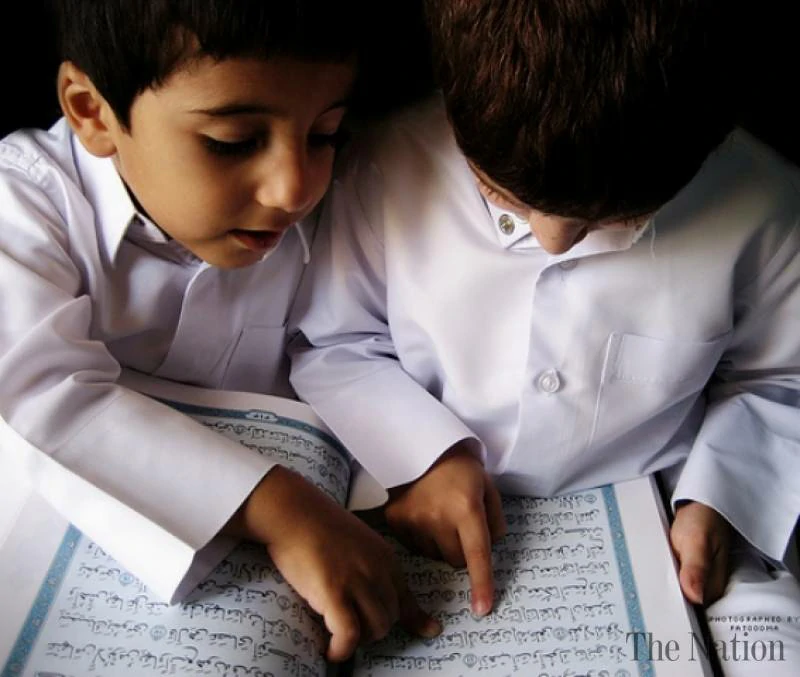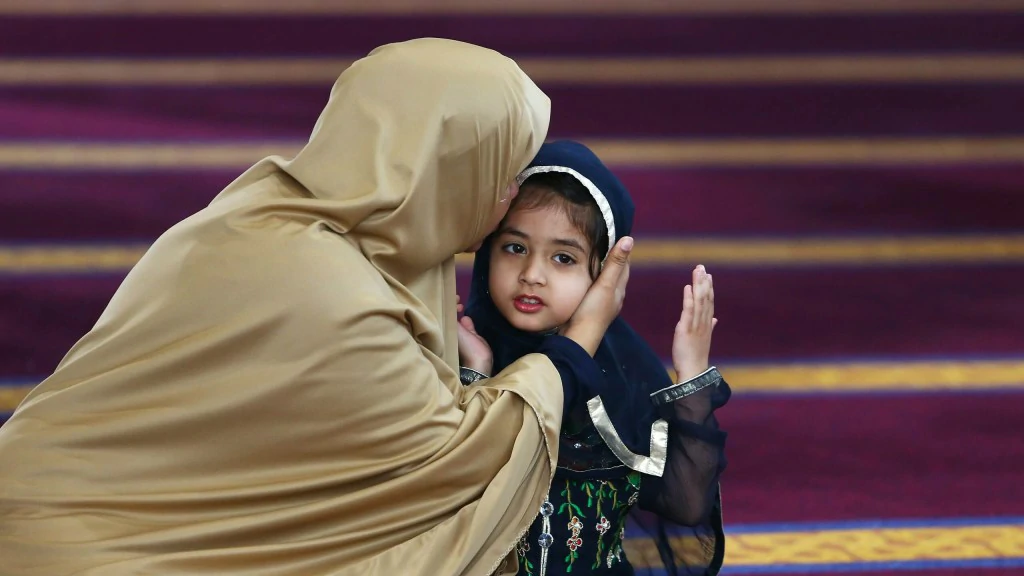Why are we looking for how to raise kids in Islam? Because Allah SWT has blessed us with children and a decent upbringing is the most acceptable gift we can give our Muslim children. However, we can all agree that parenting is challenging and perplexing since newborns do not come with a guidebook.
How to raise kids in Islam
When we learn how to raise kids in Islam, we must be sure that each child is unique, making our work as parents much more difficult.
Parenting is, without a doubt, the most challenging job on the planet.
So, what are some effective Islamic parenting strategies that parents may use to raise children who will be successful in this world and the next?
How should parents raise their kids in Islam?
Muslim parents must understand that a kid is a gift from God.
So it’s essential to know how to raise kids in Islam by parents to the fullest?
This is done perfectly by considering the following tips:
- When your child is born, recite the adhan immediately.
- Perform the Aqiqah ritual. Aqiqah is done on the seventh day.
- Teach Kalimah Tayyibah to the students.
- You don’t need to go it alone.
- Read bedtime tales to them.
- Could you make an effort to spend time with them?
- Create an environment that is both encouraging and supportive.
- Encourage inventiveness.
- Keep a watch on your children’s company.
- Assist your child as they enter puberty and the teenage years.
- Ascertain that they complete their religious commitments and understand the significance of obedience to Allah.
- Please encourage them to spend their lives pleasing Allah by instilling the deen in their hearts.
” Book your free trial now from our Islamic Studies For Kids Online Course“
What does Allah say about raising children?

The Holy Qur’an mentioned in its verses a lot about how to raise kids in Islam, such as keeping promises.
In Islam, keeping pledges is proof of trust and faith, as Allah (SWT) says in the Qur’an.
“وَأَوْفُوا بِالْعَهْدِ إِنَّ الْعَهْدَ كَانَ مَسْؤُولاً” “And fulfill the covenants; indeed all covenants are accountable.”
“وَالَّذِينَ هُمْ لِأَمَانَاتِهِمْ وَعَهْدِهِمْ رَاعُونَ“ And those who keep their trusts and covenants.”
Keeping commitments is one of the cornerstones of humanity’s success and one of the greatest attributes of one’s Akhlq, with its foundation in one’s upbringing and education.
It was told to us by the Prophet (S):
“Like your children and treat them with affection and kindness. When you make a promise to them, you must keep it because children consider you their sustainer.”
” Read also: how to pray in islam for kids“
What does the Quran say about parenting?
The Holy Quran reawakens the spirit of parenting by reminding us that children are more than just the glitz and glam of our life.
They are also a gift from Allah placed in our hands to learn how to raise kids in Islam carefully.
“Wealth and children are the adornments of the life of this world” [Verse 46 of Sura Al-Kahf (The Cave)]
This confidence in Allah, manifested in the blessing of new souls to illuminate our boring lives, maybe realized if we raise our children following the Creator’s instructions, who created the all and commanded us to preserve our essential investment of children from and protect them from danger or entering the hell.
[Verse 6 of Surah At-Tahreem (The Banning]: “O you who believe! Ward off from yourselves and your families Hell-Fire, whose.”
Similarly, suppose we do not adequately care for our children, and they grow up to be rebellious to Allah and His Messenger’s orders and not live an Islamic lifestyle. In that case, this divine trust might be shattered.
As Allah has warned us, they will become a barrier and an impediment to us practicing our deen.
[Verse 14 of Surah At-Taghabun (Mutual Loss and Gain)]: “O you who believe! Verily, among your wives and your children, there are enemies for you (i.e., may stop you from the obedience of Allah), therefore beware of them!”
Indeed, parents’ job toward their children is to nurture them by Islamic teachings to create a healthy and suitable environment in which to build an ideal Islamic society.
This is why Allah considers child-rearing a great trial and test to see if the parents are committed to Allah and Islam by raising devout decent children or failing by creating corrupt and naughty children.
How do Muslims raise kids in the West?
In light of the talk about raising kids in Islam, Raising your children in a non-Muslim nation can be challenging, especially if you want them to be good practicing Muslims.
At the same time, it’s not inconceivable. Many parents have done so, and their children have not suffered as a result.
Of course, there are specific crucial suggestions to keep in mind to ensure that everything goes smoothly.
These will make life easy for both you and your children.
And that’s crucial because life is frequently challenging enough as it is, and we don’t want to make it any more difficult. Am I correct?
Muslims raise kids in the West and learn how to raise kids in Islam traditions by paying attention to the implementation of the following factors:
-
Participate in your children’s life
The first thing you must do to learn how to raise kids in Islam carefully is ensure that you are physically there for your children.
This entails avoiding the materialism trap.
If it means you can support your children and provide them with the direction they require, it’s better to work a bit less and not have that excellent automobile to provide that for your children.
After all, kids will face considerably more temptations if they live in a non-muslim nation.
And, while kids can be protected from them, this does necessitate a more active parental role than it could otherwise.
” Read also: patience in islam for kids“
Also, because kids will not get religious instruction at school.
You will be responsible for doing so with them. Reading the Quran with them frequently – preferably every day – is the most excellent way to begin.
It does not have to be lengthy, but it must be completed. Maybe after supper or before going to bed.
Allow them to ask questions — youngsters are naturally curious.
These inquiries might be about what you’re reading as well as how it relates to what they’re going through.
-
Gain an understanding of how the children in your culture are raised

Cultural distinctions will exist across countries.
These distinctions will also exist between how you or your children were raised in your home culture and how youngsters in the new culture are raised.
This will happen whether you relocate to a non-Muslim or Muslim nation.
These differences instill expectations and beliefs in your children, which they will be exposed to – weather from other parents or other children.
If you don’t know these expectations and notions, you’re likely to be caught off guard.
As a result, keep an eye out for them.
Could you make an effort to comprehend them?
If necessary, discuss them with your Imam to determine what is allowed and what is not.
-
Compile a collection of religious teachings when you search about how to raise kids in Islam carefully
There are many books, cassettes, and DVDs available on Islam. So, why don’t you start a library?
Making your children accountable for caring for the library, as well as recommending new books and DVDs for you to collect, will give them a far greater understanding of what’s available.
Even better, they’ll be able to fulfill their intellectual curiosity by scouring the internet for resources that answer their inquiries.
You are not required to undertake it alone. It is far preferable not to.
As the cliché goes, it takes a village to raise a kid.
As a result, be confident you’re interacting with the proper village.
If your community does not have a Halaqa, speak with your Imam about starting one.
This will provide your children and you the opportunity to interact with other Muslims.
Even better, your children will be able to make friends in these areas.
These will assist and support him with the issues and difficulties they don’t feel comfortable discussing with adults (there will always be some) while being faithful to Allah’s teachings.
-
How can I be a good mother in Islam?
In light of how can I be a good mother in Islam? You should know that Mothers should ensure that other children, especially those of a different gender, are not present when caring for the hygiene of their children, e.g., giving them baths.
Fear should not be used to raise your child since it damages their personality and produces psychological disorders.
Excessive punishment by the mother, in particular, erodes the child’s emotional attachment to and regard for his mother.
A gaze or a moment of quiet can often be more beneficial than beating or scaring a child into seeing their error.
Finally, Children have a strong aversion to the term “death,” mainly if it refers to the death of their mother or father.
As a result, please don’t talk about your death or anything like that all the time unless it’s required.
Do, however, tell your child the facts about death in a straightforward, calm, and non-frightening manner.
How to raise kids in Islam: Islamic Parenting Stages

These are the years of formation when a child is continually impacted by their environment and learns by watching what’s around.
Children are the most likely to mimic their parents.
Check if you, your spouse, or a caregiver have acted similarly in front of your child if you see any undesirable conduct in your child.
These are the groundwork years, the basis on which your connection with them will be built.
The subsequent years will be a lot simpler if you establish it well.
If this fails, the coming years will be more difficult.
Children are ready for logical reasoning and Islamic principles when they reach the age of seven.
This is when youngsters are sponges, eager to absorb everything you show, teach, or tell them.
The moment has come to educate them on secular and religious information, halal versus haram, and everything kids need to learn in the second rearing stage.
Teach them athletics (sports) as well.
“Teach your children swimming, archery, and horseback riding.” the Prophet (PBUH) said.
As a result, sports should be taught to children as well. Teamwork, leadership, sportsmanship, and physical conditioning are just a few of the advantages of sports.
Children are still young at this age, and they are still learning what is good and what is wrong.
It is the role of the parents to educate their children on how to act, how to pick their surroundings, and which types of people to surround them with to keep doing what is best for them.
Society would be in disarray if there were no boundaries.
Similarly, children require a set of limits to regulate their conduct while allowing them to act and behave freely.
If they don’t know the boundaries, they won’t know what is and isn’t appropriate.
-
How to raise kids in Islam in the Final Seven Years (14-21)
Children reach independence and establish their personalities after they reach the age of 14 or puberty.
Befriend them, counsel them, and do all you can during these vital years.
Remember that they are now complete adults in the eyes of Islam, and the decisions are theirs to make, right or wrong. It is our obligation as parents to counsel them.
How to raise daughters in Islam
- Children aged six and up should have their beds segregated from one another, even if they are both daughters or sons.
- Do not allow girls under six to sit on a non-mahram man’s lap or kiss non-mahram males.
- Do not allow girls to be nude in public. Their chests and thighs, in particular, should be covered.
- Girls should be taught to appreciate their hijab, which will come naturally if they have been wearing it since childhood.
Five Basic Principles of Islamic Parenting
When we talk about How to raise kids in Islam and when it comes to parenting our children, our desire and goal should be to make them a benefit to both them and us in the future.
Here are the five concepts that must be ingrained in our everyday responsibilities of caring for our children to reach this goal:
- Kids are born pure
- Parents are guides and role models
- Kindness and mercy are the cornerstones of upbringing
- Where should you draw the line for your children?
- Tiny duties for a small shoulder to grow into a vast shoulder!
